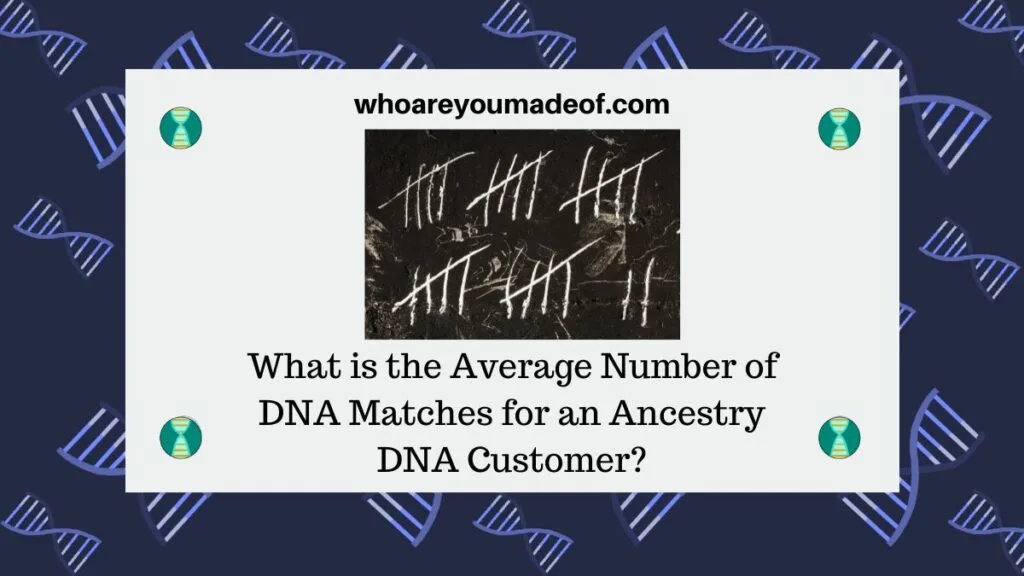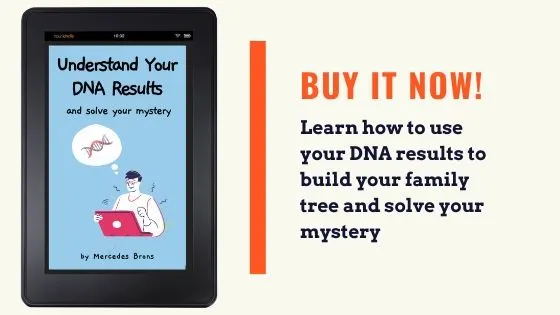It turns out that many people are curious about how many matches it is "normal" to have, or what they should expect. In this post, we will talk about what to expect as far as the average number of DNA matches for Ancestry DNA customers.

How many matches do you have? Are you disappointed in your number of matches? Or are you overwhelmed?
In this post, I hope to show you:
- How many DNA matches you can expect to have
- What factors affect the number of DNA matches that you have
How Many Matches Should I Have?
I administer 16 different DNA tests, and I can show you here the approximate number of DNA matches that each of those test takers has, and the average. As you can see from the different numbers that correspond to the different DNA kit, the number of matches that you can have on Ancestry can vary wildly.
You will learn the top reasons why everyone has a different number of DNA matches in the next section of this post.
- 18,952
- 13,158
- 46,343
- 22,101
- 22,761
- 12,039
- 17,444
- 8,775
- 14,520
- 48,486
- 56,487
- 9,869
- 12,269
- 8,773
- 11,915
- 3,363
Average number of DNA matches for these 16 Ancestry DNA customers: 20,453
A few notes on the above list:
- Test taker #6 has one parent from the Philippines
- Test taker #8 has a father born in another country
- Test takers #10 and #11 are white, with most lines of their family tree going back to colonial times in the United States.
- Test taker #13 is African-American
- Test taker #16 was born in Mexico
This is all very important, as you will realize after you read the next section.
What Factors Affect the Number of DNA Matches that I Have?
Many people who take the Ancestry DNA test - or any other genetic genealogy DNA test, for that matter - are frustrated if they don't have very many DNA matches. It can be tempting to blame the testing company, but in reality, our DNA only matches who it matches.
So, why do some people have thousands upon thousands of matches, and others have only several hundred?
Number of matches will be higher if most distant cousins live in the USA
Where do you think most of your 2nd-8th cousins live right now? If one or both of your parents are from a country other than the U.S., or even if a grandparent or great-grandparent was from another country, consider that their extended family might still live in that country.
Depending on whether or not DNA testing is popular there, many of your DNA relatives just might not have done a test like this - yet.
Every family has a different number of children
Some of your ancestors might have a lower than the usual number of average children, making the number of their descendants much smaller than the statistical average.
Some people have endogamy in their DNA matches
If you have a very, very large number of DNA matches, it could be that you and your extended family share a higher than usual (for the relationship type) amount of DNA because of something called endogamy.
A simple way to explain endogamy is where cousins (distant, not first or second) repeatedly marry each other throughout the generations. Their descendants are more genetically related to each other than they typically would be, and so more of them would show up on an autosomal DNA test, like the one that Ancestry DNA offers.
Endogamy happens in relatively small communities where there isn't a lot of genetic diversity. Examples of this occurred in Colonial US, among Native Americans of North and South America, and Ashkenazi Jewish communities.
Do you want more DNA matches?
If you are disappointed in the number of DNA matches that you have on Ancestry DNA, you might consider uploading your DNA to Gedmatch, as well as Family Tree DNA, and MyHeritage - all for free. Family Tree DNA and My Heritage DNA are testing companies.
Gedmatch is a free website where users from all of the major testing sites can upload their DNA for comparison and analysis.
Conclusion
- Remember that it's about quality over quantity. Just a handful of high-confidence, 2nd-4th cousin matches with solid trees are more valuable from a genealogical standpoint than 10,000 8th cousins any day! So even if you only have a few, that's a great start.
- Not all of your 3rd-8th cousins will match you via DNA, but they are still related to you on your family tree and can still help you research your family's history.
- As these types of DNA tests become more popular, you will continue to get new family DNA matches. Check back once in a while to see if anyone new and interesting has popped up!
I hope that you learned a bit from this article about how many DNA cousins matches you can expect to have. If you have anything to add, questions or comments, I would love to hear from you.
Leave me a comment in the discussion area below!


D.B.
Tuesday 21st of February 2023
Hi. I've recently had family members take Ancestry.com's DNA test. My daughter-in-law has over 153,000 matches. I thought surely that must be some kind of mistake! She's always told us that she has lots of cousins and that they mostly all lived in the same area of Virginia. I never thought or heard of endogamy. Now I wonder if this is the reason why.
Thanks for your article.
Joel Weiner
Sunday 5th of June 2022
What is the largest number of DNA matches you've seen on ancestry.com? I have close to 250,000.
Mercedes
Friday 10th of June 2022
Hi Joel, Wow! That is certainly quite a large number of matches. I have not seen any tests with that high number of matches. The highest number that I have seen lately is in the 65k range. Best of luck to you sorting through those matches!! Sincerely, Mercedes